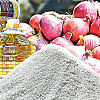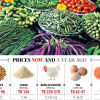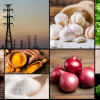Food prices hiked even before Ramadan

Though there is currently no supply crunch in the country, a section of unscrupulous importers and traders have already hiked the prices of essentials, creating an artificial crisis to make extra profits ahead of Ramadan, said a home ministry report.
This trend of raising prices may have an adverse impact during Ramadan, expected to begin on March 11, and if measures are not taken to stop it, the market may become volatile during the month of fasting, it said.
The ministry's Public Security Division prepared the report last month and sent it to the ministries of commerce, agriculture, and food, and the Directorate of National Consumers Right Protection (DNCRP), and some other authorities concerned. It also made recommendations to ensure the market's stability.
Every year, the prices of essentials, such as edible oil, sugar, chickpeas, pulses, dates and onions, invariably rise ahead of Ramadan as their demand rises.
The prices of chickpeas, dates, and soybean oil have already seen a surge in Dhaka much ahead of Ramadan, due to the price hike of some commodities in the international market, adding more pressure on the low- and limited-income groups, who are already grappling with price hikes.
The Daily Star has seen a copy of the report, which highlighted a comparative analysis of the prices of these items, price differences in the local and international markets, supply-demand situation, and stock and import pipelines of the major importers.
According to it, the price of sugar jumped from Tk 110 to Tk 120 per kg in January last year, which increased to Tk 140-145 in January this year.
On the first day of Ramadan last year, which was on March 24, the price increased from Tk 115 to Tk 120.
Meanwhile, the price of the local variety onions saw a jump during this time period from Tk 30-35 to Tk 75-80 per kg, the report said.
Analysing the opening Letter of Credit (LC) of various products from July to December 2022 and 2023, the report said fewer LCs were opened for soybean oil, palm oil, sugar, lentils, chickpeas and dates than the previous year.
However, the rate of opening LCs increased this January, centring the month of Ramadan.
"There will be no supply shortage in the market if the LC goods are offloaded at the right time," it said.
According to the report, unscrupulous importers of the country increase the prices of their products in the domestic market as well in the international market.
In many cases, they use the price hike in the international market as an excuse to increase it in the domestic market even before the goods are supplied, which takes around two months according to the import order.
Such dishonest activities of traders and importers play a big role in the price hikes of goods.
On the other hand, even when the prices of goods decrease in the international market, the impact on the domestic market is not visible.
There is also a lack of competition in the import market as only a handful of traders are involved in process of importing goods. As a result, the prices of imported goods are being controlled by them.
Due to scarce competition, they get the opportunity to increase the prices by syndicating among themselves for illegal profit, the report stated.
Taslim Shahriar, senior assistant general manager at Meghna Group of Industries, one of the biggest commodity importers and processors, said "We are trying to open the LC according to the demand… If the government can stop the extortion in transporting goods, consumers will be able to buy goods at lower prices."
If uninterrupted gas and electricity supply is provided, consumers will also be able enjoy the benefits, he added.
An official of another major importing company, preferring anonymity, said that due to the dollar shortage, they are facing difficulties in opening LCs as per the requirement.
Abul Hashem, president of Bangladesh Sugar Traders' Association, said the government has to verify the demand, import and pipeline information of essential commodities.
"A few days ago, in a meeting with the government, I said that if the statistics are correct, then there is no reason to increase the prices of commodities around Ramadan."
Hashem, also the general secretary of the Bangladesh Edible Oil Wholesalers Association, said the government has reduced VAT and duty on some products centring Ramadan a few days ago.
He, however, believes the rates were not as reduced as they should have been. "The reduction will not benefit the consumers much."
RECOMMENDATIONS
The report recommended involving more importers in the import process to prevent the syndication among certain business groups in the import of essentials.
"Initiatives should be taken to remove complexities related to opening LCs to ensure uninterrupted import of goods."
It added that extortion in the transport of goods must be stopped, while uninterrupted gas and electricity supply in goods-producing industries must be ensured.
The report further suggested strengthening the market monitoring system and conducting regular drives by the authorities concerned to prevent illegal hoarding during Ramadan.
The Daily Star contacted ministers and secretaries of commerce, food and agriculture for their comments. Only Wahida Akter, secretary to the agriculture ministry, responded.
She acknowledged getting the report and said, "We are surprised to see the surge in the prices. They were not supposed to be high given the number of essential commodities produced in the country and the current supply situation we have.
"Small, large, medium and corporate businesspersons are hoarding and selling essentials at a higher price at their convenience."
Wahida, however, stressed that the government is now more active than before in terms of keeping the prices of essentials stable.
Earlier on Sunday, State Minister for Commerce Ahasanul Islam in parliament said, "If any hoarding or manipulation is attempted, appropriate action will be taken… I hope to be able to ensure the supply of food during the month of Ramadan."

 For all latest news, follow The Daily Star's Google News channel.
For all latest news, follow The Daily Star's Google News channel. 








Comments